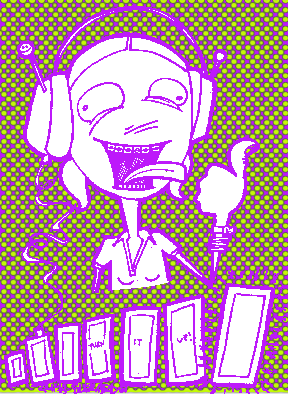Turn It Down
Jennifer, 17, warns teens that they could hurt their hearing if they listen to music too loudly.
My friend Becky and I were on our way to camp, listening to our CD Walkmans and rocking out to music. She wanted me to hear a song and handed over her earphones. When I put them on it was like BANG! Her music was so loud, I flew back in my seat.
She laughed and was disappointed that she couldn’t make it louder.
Many teenagers seem to think the volume is never high enough. Whether they’re losing their hearing and need it to be louder or want to share their music with the whole world, I really can’t say. I told Becky to be careful or she’d go deaf. That’s no joke. I seem to be losing my hearing to loud music.
It all started two years ago. I went to the school nurse to get my annual hearing test. She kept testing this one tone, and every time she played it, I heard nothing. She asked me if I listened to lots of loud music, and I said "Yes." She told me I didn’t have any critical hearing loss, but if I continued to listen to music at that same volume I could lose a substantial amount. That really terrified me, especially because there aren’t medical treatments to reverse the damage, only hearing aids to help you after the fact.
I decided to turn it down
My regular doctor said my hearing was fine and not to worry, but I didn’t want to lose my hearing at such a young age, so I decided to play it safe and turn down the volume. However, many teenagers aren’t aware that something as seemingly harmless as listening to a little rock music could damage your hearing permanently.
Statistical data on teenage hearing loss is hard to find, however, Andy Vermiglio, an audiologist at the House Ear Clinic, warned that everyone, including teens, with prolonged exposure to loud noise could damage their hearing.
He told me about a patient who had come to him when she was 7 years old and had substantial hearing loss in her right ear. At first he couldn’t figure out why one ear would be more damaged than the other. Then she told him that her older brother drove her to school every day, blasting the radio with the speaker next to her right ear.
Though her case is more extreme than most, Vermiglio cautioned that everyone’s hearing is potentially at risk.
"If you’re going to be in a noisy environment, and you have to raise your voice (to be heard), that’s the time to put in the ear plugs," said Vermiglio, a drummer since the age of 8 who has had his own experiences with hearing loss. He said he lagged behind when he was in school because he had problems hearing the teacher and just tuned out in class.
Another local doctor had this to say about hearing loss: "Hearing loss in teens is uncommon," said Dr. Frederic R. Di Tirro, a Kaiser Permanente ear specialist. "Most people who listen to music on home stereos or portable audio players are unlikely to stuffer noise-induced hearing loss. Of course, musicians and those who frequent very loud venues frequently should use ear protection. I have seen a case of permanent hearing loss from standing near a loudspeaker at a loud club."
So how do you know when it’s too loud? When you talk to someone normally, that level of conversation is typically at 60 decibels, the unit for measuring loudness of sounds. Noise becomes harmful around 75 decibels. But it’s not like anyone regularly measures noise decibels. If you can’t hear normal conversations when the music is on, it’s probably damaging your hearing.
Constant exposure to excessively loud noise can permanently damage the cochlea, which are tiny hair-like receptors in the inner ear that are instrumental in transmitting sounds to the brain. Listening to loud music through earphones directly impacts the cochlea and can damage the ears. Permanent hearing loss occurs from constant exposure.
While that may sound extreme, it really doesn’t take much for your poor ears to be affected by noise. Temporary hearing loss occurs after just 15 minutes of exposure to loud noises. Your body lets you know when this happens, because there’s a ringing in your ears, a condition known as tinnitus. Usually the ringing goes away after a while, and things return to normal.
How can you tell if your hearing has been damaged? According to Dr. Di Tirro, "Signs of hearing loss are inability to hear familiar sounds like the click of a car turn signal or trouble understanding words. Tinnitus is the sensation that one is hearing a sound when there is no sound. It can be a sign of hearing loss. However, some people have hearing loss and no tinnitus and some people with tinnitus have no hearing loss."
Sounds above 85 decibels (dB) may cause permanent hearing loss. Some examples of loud noises that can cause noise-induced hearing loss are:
Hair dryer/Lawn mower/Leaf blower 85-90 dB
Wood shop/Chainsaw/Firecrackers (small) 100-110 dB
Rock concerts 110-130 dB
Ambulance siren/Jet take-off 119-140 dB
Source: House Ear Clinic, Los Angeles





